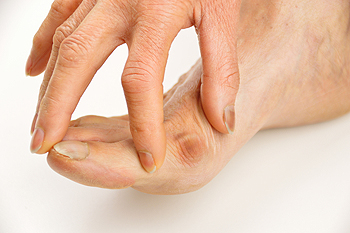Bunions—a very common foot disorder—are bony protrusions on the joint of the big toe, which cause it to point towards the second toe. Bunions can be very painful and are often genetic, or caused by wearing shoes that are too tight. Bunionettes, or tailor’s bunions, are a form of bunion that appears on the outside of the pinky toe. Bunions and bunionettes are painful, and can cause swelling, redness, and soreness around the joint, along with limited range of movement. Bunions that are left untreated can cause deformities or misalignments in the foot and may require surgery to correct. One of the best ways to prevent bunions and bunionettes from forming is to wear comfortable, low-heeled shoes with a rounded toe-box, which will allow plenty of room for your toes to spread out and move freely. Contact a podiatrist who can offer preventative measures against bunions, or treat them successfully if they do form.
If you are suffering from bunions, contact Dr. Yeon A. Shim of Roselle Podiatry Group. Our doctor can provide the care you need to keep you pain-free and on your feet.
What Is a Bunion?
A bunion is formed of swollen tissue or an enlargement of boney growth, usually located at the base joint of the toe that connects to the foot. The swelling occurs due to the bones in the big toe shifting inward, which impacts the other toes of the foot. This causes the area around the base of the big toe to become inflamed and painful.
Why Do Bunions Form?
Genetics – Susceptibility to bunions are often hereditary
Stress on the feet – Poorly fitted and uncomfortable footwear that places stress on feet, such as heels, can worsen existing bunions
How Are Bunions Diagnosed?
Doctors often perform two tests – blood tests and x-rays – when trying to diagnose bunions, especially in the early stages of development. Blood tests help determine if the foot pain is being caused by something else, such as arthritis, while x-rays provide a clear picture of your bone structure to your doctor.
How Are Bunions Treated?
- Refrain from wearing heels or similar shoes that cause discomfort
- Select wider shoes that can provide more comfort and reduce pain
- Anti-inflammatory and pain management drugs
- Orthotics or foot inserts
- Surgery
If you have any questions, please feel free to contact our office located in Roselle, NJ . We offer the newest diagnostic and treatment technologies for all your foot care needs.

